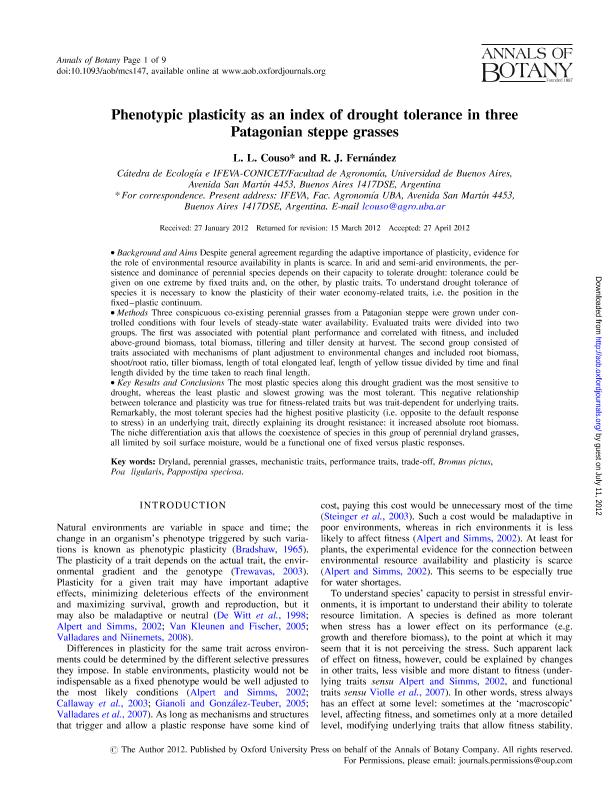Artículo
Phenotypic plasticity as an index of drought tolerance in three Patagonian steppe grasses
Fecha de publicación:
09/2012
Editorial:
Oxford University Press
Revista:
Annals of Botany
ISSN:
0305-7364
Idioma:
Inglés
Tipo de recurso:
Artículo publicado
Clasificación temática:
Resumen
Background and AimsDespite general agreement regarding the adaptive importance of plasticity, evidence for the role of environmental resource availability in plants is scarce. In arid and semi-arid environments, the persistence and dominance of perennial species depends on their capacity to tolerate drought: tolerance could be given on one extreme by fixed traits and, on the other, by plastic traits. To understand drought tolerance of species it is necessary to know the plasticity of their water economy-related traits, i.e. the position in the fixedplastic continuum.MethodsThree conspicuous co-existing perennial grasses from a Patagonian steppe were grown under controlled conditions with four levels of steady-state water availability. Evaluated traits were divided into two groups. The first was associated with potential plant performance and correlated with fitness, and included above-ground biomass, total biomass, tillering and tiller density at harvest. The second group consisted of traits associated with mechanisms of plant adjustment to environmental changes and included root biomass, shoot/root ratio, tiller biomass, length of total elongated leaf, length of yellow tissue divided by time and nal length divided by the time taken to reach nal length.Key Results and ConclusionsThe most plastic species along this drought gradient was the most sensitive to drought, whereas the least plastic and slowest growing was the most tolerant. This negative relationship between tolerance and plasticity was true for fitness-related traits but was trait-dependent for underlying traits. Remarkably, the most tolerant species had the highest positive plasticity (i.e. opposite to the default response to stress) in an underlying trait, directly explaining its drought resistance: it increased absolute root biomass. The niche differentiation axis that allows the coexistence of species in this group of perennial dryland grasses, all limited by soil surface moisture, would be a functional one of fixed versus plastic responses. © 2012 The Author.
Archivos asociados
Licencia
Identificadores
Colecciones
Articulos(IFEVA)
Articulos de INST.D/INV.FISIOLOGICAS Y ECO.VINCULADAS A L/AGRIC
Articulos de INST.D/INV.FISIOLOGICAS Y ECO.VINCULADAS A L/AGRIC
Citación
Couso, Luciana Laura; Fernandez Alduncin, Roberto Javier; Phenotypic plasticity as an index of drought tolerance in three Patagonian steppe grasses; Oxford University Press; Annals of Botany; 110; 4; 9-2012; 849-857
Compartir
Altmétricas




